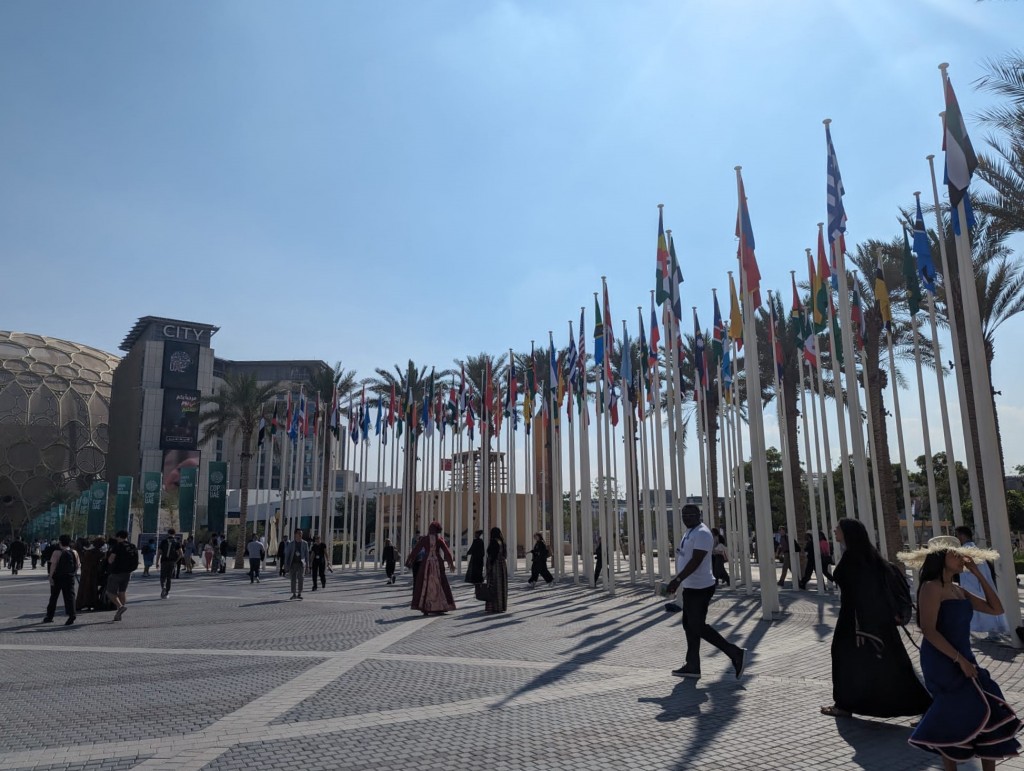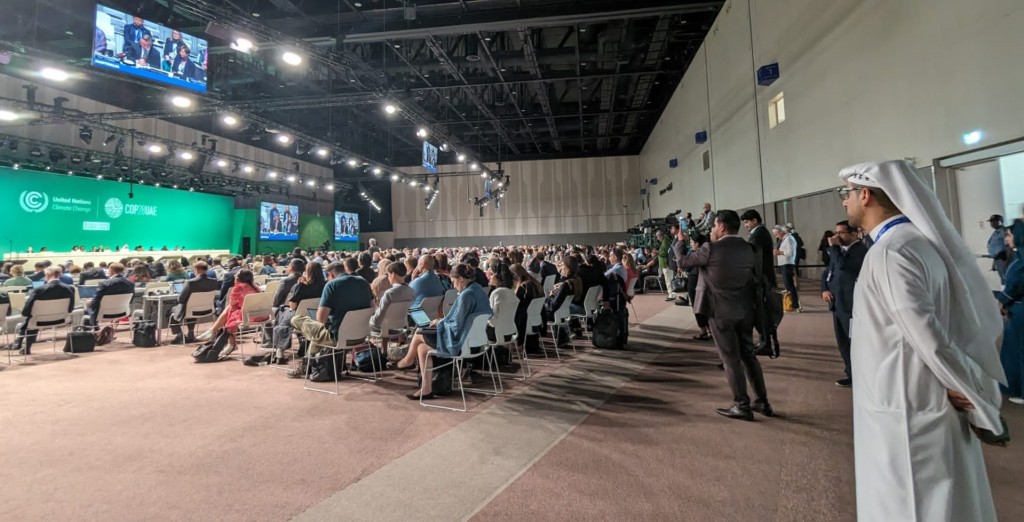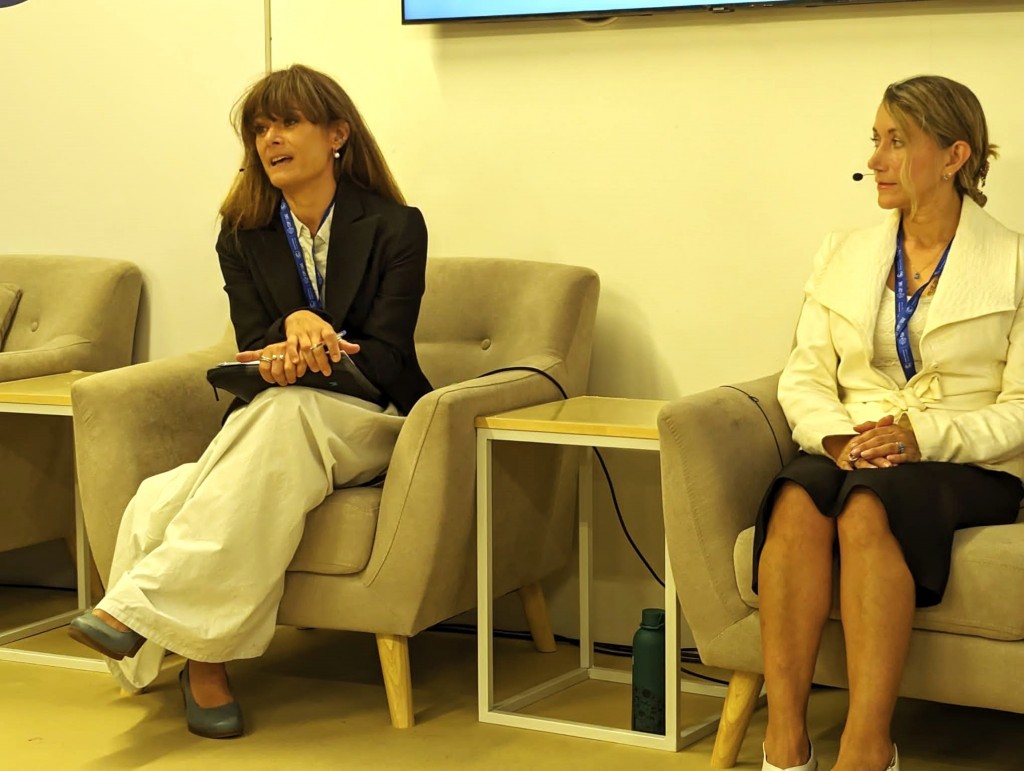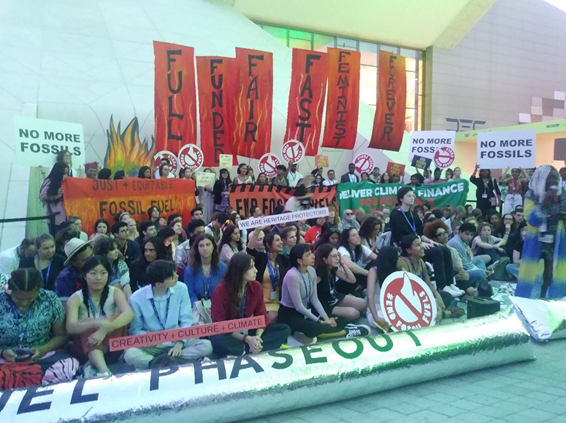15/12/2023

Susana Borràs Pentinat, researcher from the Department of Public Law and the Tarragona Centre for Environmental Law
The Climate Change Conference: the beginning of the end?
Susana Borràs, a researcher from the Department of Public Law of the URV, took part in COP28 as an expert in Rights of Nature. In this article, she assesses the resulting agreement, which is still far from the safety threshold recommended by the scientific community

Susana Borràs, a researcher from the Department of Public Law of the URV, took part in COP28 as an expert in Rights of Nature. In this article, she assesses the resulting agreement, which is still far from the safety threshold recommended by the scientific community
Between 30 November and 12 December, the 28th United Nations Conference on Climate Change (COP28) was held in Dubai (Arab Emirates), bringing together all those states that had signed the United Nations Framework Convention on Climate Change and the Paris Agreement. The main purpose of this international meeting was to make the first assessment (the so-called “Global Stocktake” – GST) of climate action commitments (the so-called “nationally determined contributions”), which states had assumed as part of the Paris Agreement, adopted at COP21 in 2015, with the aim of accelerating climate action before the end of the decade and limiting the global temperature increase to 1.5ºC.
From the outset, COP28, which brought together around 85,000 people, was surrounded by constant controversy. The first bone of contention was that this international meeting, which was to take decisions on crucial issues about climate change, was paradoxically held in one of the five countries that generate the most carbon dioxide emissions per capita in the world and which is the main producer of oil. In addition, considering that the effects of climate change have serious repercussions on human rights and that last 10 December was the 75th anniversary of the Universal Declaration of Human Rights, Saudi Arabia – one of the countries that most violates human rights, including freedom of expression, association and assembly, and which supplies weapons to the conflicts in Yemen, Libya, Ethiopia and Sudan – was a highly unlikely choice of venue. And to make matters worse, the appointment of Sultan Al Jaber, executive director of the state oil company ADNOC, one of the largest oil producers in the world, as president of the COP did not bode well.

The document agreed on does not use the verb eliminate but at least establishes a horizon for fossil-fuel phaseout
Even so, the COP closed with an agreement that signals the “beginning of the end” of the fossil fuel era, to quote Simon Stiell, the executive secretary of the United Nations for Climate Change. For the first time in the history of climate negotiations, the foundations are being laid for a quick, fair and equitable transition, apparently supported by significant cuts in emissions and more funding. It has taken 28 years for politicians to finally heed the demands of science and civil society, and especially the voices of those who are already feeling and suffering the effects of climate change and those who represent future generations.
Reaching this point was by no means an easy process. After hours of negotiations until the early hours, the first document was rejected, among others, by the European Union, the United States and the countries most affected by the effects of climate change for not meeting the vital request to “eliminate the use of fossil fuels”. Finally, although the document agreed on does not use the verb, “eliminate”, it does at least establish a horizon for phasing out fossil fuels, which are largely responsible for climate change. Indeed, the document reiterates not only the need to maintain the objective of the Paris Agreement of not exceeding the safety threshold of global warming set by the scientific community – that is, an increase of 1.5ºC with respect to pre-industrial levels – but also the need to transition towards the progressive phaseout of fossil fuels.

Current plans are leading us to an increase in global temperature of between 2.1 and 2.8ºC, well above the safety threshold recommended by the scientific community
This is the first time that a COP document has made reference to this momentous issue. However, while this is good news, it is not enough, as it is not in line with the blunt demands coming from the scientific community and civil society. And, moreover, the climate balance is negative. The States are not on track to achieve the goals of the Paris Agreement. Greenhouse gas concentrations have continued to rise and, according to the United Nations Environment Programme, current plans envisage a global temperature increase of between 2.1 and 2.8ºC, well above the safety threshold recommended by the scientific community.
According to climate science, the climate emergency requires more urgent, forceful and sustained measures that, in comparison to 2019, will generate a 43% cut in emissions by 2030 and a 60% cut by 2035, and will reach zero net emissions by 2050. The scientific community is repeatedly reminding us of the danger of exceeding the global warming limit of 1.5 degrees and that avoiding it will not be possible without the gradual phaseout of all fossil fuels in a reasonably short time.
Neither are the promises to feed the damage fund with 700 million dollars sufficient. When this fund was created at COP26 in Glasgow there was talk of contributing 100,000 million dollars per year. Even this figure is insufficient if we take into account the effect the climate damage generated in both the past and the present has had on the poorest countries. But, above all, it is insufficient in comparison to the 1.3 trillion dollars which, according to the International Monetary Fund, is allocated every year to subsidise fossil fuels around the world.
The participation of civil society has been limited by the fact that street demonstrations are not allowed in the United Arab Emirates
Civil society climate action has also played a key role in the history of climate negotiations, demanding climate justice and the protection of human rights. For this reason, it needs to make its presence felt in the official negotiation arenas. In this COP28, the participation of civil society has been limited by the fact that street demonstrations are not allowed in the Arab Emirates. Any criticism of or opposition to the State or its representatives is punishable by life imprisonment or even the death penalty as is belonging to a dissident group. Even so, the force of the people’s voice was felt in the arena where government negotiations took place, the so-called “blue zone”.

The outcome of the COP, which has been described as “historic”, is not something that can be attributed to politicians. It is thanks to the work of the scientific community, to the mobilisation of society for climate justice and human rights, to the civil disobedience of younger people and the people who are in the front line of climate impacts, paying the consequences of the actions of a minority, who continue to eco-justify their grandiloquent speeches and actions by referring to themselves as saviours, while they continue to amass wealth, favouring the plutocracy and corporatocracy of capitalism while sacrificing the present and future of humanity and the planet.
There really can only be a “beginning of the end” if respect is given to the rights of people, especially the most vulnerable, and we learn to live, finally, in harmony with Nature and Mother Earth.
More news about: Opinion
